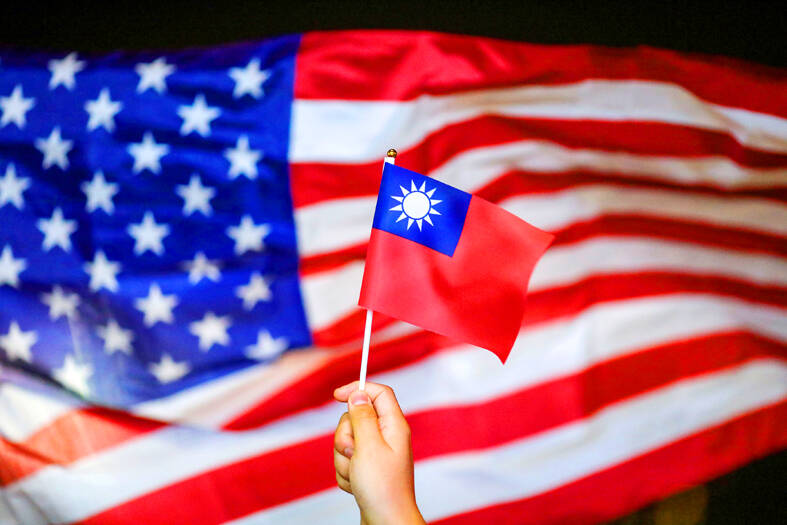A poll released by a Chicago-based think tank shows that more Americans now support using the US Navy to break a Chinese blockade against Taiwan, while support for sending US troops to Taiwan to help fight off a Chinese invasion also grew from 36 percent last year to 43 percent this year.
The number of Americans supporting Taiwan is growing, but the US public prefers maintaining the “status quo” rather than risking military confrontation, the survey published by the Chicago Council on Global Affairs on Monday showed.
According to the survey, on a scale from 0, very hostile, to 100, very friendly, Americans’ perception of Taiwan stood at about 57, on a par with South Korea, and between Japan, 67, and India, 48.

Photo: Reuters
The perception of China stood at 38 points.
“Seven in 10 Americans say trade between the United States and Taiwan does more to strengthen US national security, at 70 percent, than it does to weaken it, only 24 percent,” the survey said.
The view that US-Taiwan trade relations were beneficial to US national security was shared across party lines, although independents (71 percent) and Democrats (74 percent) were more inclined toward the view than Republicans, at 64 percent, the survey showed.
When asked whether the US should adopt more tangible policies to support Taiwan, 40 percent said they were unable to answer without being better informed, and the number of respondents who said the US should adopt such policies outnumbered those who opposed it, the survey showed.
US-Taiwan free-trade agreements were the most supported policy, with 51 percent supporting them, 6 percent opposed and 41 percent unsure, it showed.
Including Taiwan in international organizations, such as Interpol or the International Civil Aviation Organization, had the support of 46 percent of respondents, it showed.
In the event of a Chinese invasion of Taiwan, Americans were more in favor of providing support, but opposed getting directly involved, the survey showed.
The survey showed that 77 percent of respondents favored sending food and medical supplies, 71 percent favored imposing economic and diplomatic sanctions on China, and 63 percent favored sending additional arms and military supplies to Taiwan.
The survey showed that 47 percent of respondents, up 10 percentage points from last year, supported using the US Navy to break a Chinese blockade, even if it would trigger a direct US-China conflict.
The survey also showed that 43 percent of respondents supported sending US troops to Taiwan to defend against China, the highest support across four years and up 7 percentage points from last year.
The survey showed that half of Americans supported maintaining the “status quo,” while 35 percent encouraged Taiwan to move closer to independence.
Chicago Council on Global Affairs director of public opinion and foreign policy Craig Kafura, the author of the report, said that the survey showed a shifting public mood in the US.
“Over the past year, Americans of all political stripes have become more likely to support aid to Taiwan in the event of a Chinese invasion,” Kafura said.

Taiwan has received more than US$70 million in royalties as of the end of last year from developing the F-16V jet as countries worldwide purchase or upgrade to this popular model, government and military officials said on Saturday. Taiwan funded the development of the F-16V jet and ended up the sole investor as other countries withdrew from the program. Now the F-16V is increasingly popular and countries must pay Taiwan a percentage in royalties when they purchase new F-16V aircraft or upgrade older F-16 models. The next five years are expected to be the peak for these royalties, with Taiwan potentially earning

STAY IN YOUR LANE: As the US and Israel attack Iran, the ministry has warned China not to overstep by including Taiwanese citizens in its evacuation orders The Ministry of Foreign Affairs (MOFA) yesterday rebuked a statement by China’s embassy in Israel that it would evacuate Taiwanese holders of Chinese travel documents from Israel amid the latter’s escalating conflict with Iran. Tensions have risen across the Middle East in the wake of US and Israeli airstrikes on Iran beginning Saturday. China subsequently issued an evacuation notice for its citizens. In a news release, the Chinese embassy in Israel said holders of “Taiwan compatriot permits (台胞證)” issued to Taiwanese nationals by Chinese authorities for travel to China — could register for evacuation to Egypt. In Taipei, the ministry yesterday said Taiwan

Taiwan is awaiting official notification from the US regarding the status of the Agreement on Reciprocal Trade (ART) after the US Supreme Court ruled US President Donald Trump's global tariffs unconstitutional. Speaking to reporters before a legislative hearing today, Premier Cho Jung-tai (卓榮泰) said that Taiwan's negotiation team remains focused on ensuring that the bilateral trade deal remains intact despite the legal challenge to Trump's tariff policy. "The US has pledged to notify its trade partners once the subsequent administrative and legal processes are finalized, and that certainly includes Taiwan," Cho said when asked about opposition parties’ doubts that the ART was

If China chose to invade Taiwan tomorrow, it would only have to sever three undersea fiber-optic cable clusters to cause a data blackout, Jason Hsu (許毓仁), a senior fellow at the Hudson Institute and former Chinese Nationalist Party (KMT) legislator, told a US security panel yesterday. In a Taiwan contingency, cable disruption would be one of the earliest preinvasion actions and the signal that escalation had begun, he said, adding that Taiwan’s current cable repair capabilities are insufficient. The US-China Economic and Security Review Commission (USCC) yesterday held a hearing on US-China Competition Under the Sea, with Hsu speaking on